News
U.S. Strikes Iran’s Nuclear Sites Amid Rising Tensions

WASHINGTON, June 21 (Reuters) – U.S. forces launched airstrikes against Iran‘s nuclear facilities on Saturday, as President Donald Trump issued a stark warning that Tehran would face more attacks if it did not seek peace. The strikes are the latest escalation in a conflict that has heightened tensions in the Middle East.
Trump announced the military action in a televised address, stating, “The strikes were a spectacular military success. Iran’s key nuclear enrichment facilities have been completely and totally obliterated.” He emphasized that Iran’s future depends on choosing between peace or tragedy, suggesting that further military operations could follow if diplomatic resolutions fail.
The targets of the airstrikes included Natanz, Isfahan, and Fordow, with Trump revealing that U.S. forces dropped six bunker-buster bombs on Fordow, among other military actions. He confirmed to Fox News that a total of 30 Tomahawk missiles were used against the other nuclear sites.
A U.S. official, speaking on condition of anonymity, indicated that U.S. personnel were involved in the planning and execution of the strikes. In response, Iranian officials acknowledged that their facilities came under attack but claimed that the damage was limited and their nuclear programs had already been evacuated from the sites.
Mohammad Manan Raisi, an Iranian lawmaker, stated that the Fordow facility had not suffered significant destruction. The Iranian government asserted there were no signs of contaminants released due to the strikes, and that the enriched uranium reserves had been moved to prevent potential radiation hazards.
Israeli Prime Minister Benjamin Netanyahu praised Trump’s decision, emphasizing that it aimed to prevent Iran from acquiring nuclear weapons. This military action comes amid ongoing hostilities between Israel and Iran, with both sides engaging in aerial combat recently, resulting in casualties in both nations.
In the wake of the strikes, United Nations Secretary-General Antonio Guterres labeled the action a “dangerous escalation” and a direct threat to international peace and security. As tensions continue to rise, both countries have targeted energy infrastructures, raising concerns about global oil prices and economic repercussions.
U.S. Defense Secretary Pete Hegseth scheduled a news conference at the Pentagon to address the situation further. Meanwhile, several lawmakers expressed their concerns, cautioning that Trump should seek congressional approval prior to military engagement. Democratic Representative Alexandria Ocasio-Cortez described the actions as potential grounds for impeachment, while Republican Representative Thomas Massie labeled them unconstitutional.
As these developments unfold, the world watches closely to see how the conflict will impact not only regional stability but also the global economy.












